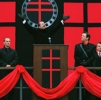V for Vendetta
“From the creators of The Matrix!“
I remember days when that tagline would have filled me with excitement and glee. Sadly, those times have passed, and a few dodgy sequels confirmed to me that the Wachowskis were, in fact, mere mortals. And now they’re adapting one of Alan Moore’s comic books, V for Vendetta, to the screen.
The story is a good one. In the near future, America has gone under, and Britain has become a dictatorship in the style of 1984. Chancellor Adam Sutler has taken control after creating an atmosphere of complete fear and xenophobia, and orchestrating a certain amount of heinous manipulations in the past. There’s scaremongers on the news, there’s secret police on the streets, homosexuals are made to disappear… It’s not a nice place. But then there’s V, a mysterious terrorist who explodes the Old Bailey, and then proclaims that a year from now, the Houses of Parliament are going to get it too. Are V’s powers of manipulation a match for Sutler’s?
A modern audience going to see V for Vendetta might pick up on a few similarities between scenarios presented here and those they’ve seen in real life. When the characters are explaining the methods Sutler used to gain power, it feels like a direct lift from Fahrenheit 911. Which seems unfair, given the comic was written in the eighties — though I can’t guarantee what from the comic was actually in the film. Without further research, I’m not willing to hail Alan Moore as a magnificent seer, but by the same tack, I won’t take the film to task for saying a few things we’ve been told before. The politics is integral to the story, and it works. It’s just a shame that it may appear to some as a typical lefty-Hollywood-propaganda piece, and not a proper film in it’s own right.
I’m glad that’s out of the way. Vendetta by and large is a solid action-thriller, but it joyfully throws several curve-balls at you for the first hour or so. After a reasonably run-of-the-mill “let’s establish an oppressive dystopia” opening, V (Hugo Weaving) turns up to rescue Evey (Natalie Portman) from being raped by the secret police. He pulls his standard vigilante violence on them… and then starts to explain who he is and what his problems with the world are, only using words that begin with the letter V. It’s like you’ve wandered into a particularly brutal episode of Sesame Street. V turns out to be conflicted, funny, pompous, well-meaning, brutally ruthless and often hilarious, and it’s his masked figure that really made the film stand out from other, more bland action films like Equilibrium. Weaving’s awesome voice and imposing body language really sell a character who could quite easily have just appeared crap.
Things continue nicely from an intriguing beginning, into a surprising middle section. V and Evey1 get split up and Stephen Fry does a brilliant turn as a sympathetic television personality. For some reason, I can watch Fry in a serious role and not want to laugh; I still seek the ability to do the same for Coupling‘s Ben Miles, who here plays the head Media Honcho in the dictatorship. In a side plot, the excellent Stephen Rea’s noble but grumpy Inspector Finch doggedly pursues answers that he knows he’s not supposed to go near. Things get even more interesting after that and then… the film starts surprising you yet again, but not in a good way.
Suddenly, the oddest things start to happen. The clear but unobtrusive direction that linked V and Evey at the start of the film suddenly starts ramming itself down your throat. V contacts the police and tells them a neat summary of a bunch of things both they, and we, already knew. Afterwards, the Inspector runs over it all again, which leads to a cute joke but still turns out to be completely pointless. In fact, the plot gets reiterated so many times in the last few minutes, that you’re completely convinced some sort of plot twist is about to turn up. It doesn’t.2 The portentous dialogue starts tipping the scales against V’s delightful silliness.3 To the film’s credit, though, I can reveal that V never sweeps off his mask and asks if Evey can accept him for who he truly is.
But here’s the key to the flaw in this film, to me. 1984 and various other brutal fictional dictatorships have been shown to us over the year. They’re nasty, they’re oppressive, and often they run the world, and the protagonists, into the ground. This one tries hard to show it’s in the same league. They’ve got big red podiums, flags, nasty sneering men and scary moustaches. But it plainly sucks, and it demeans V in the process. Or, to look at it another way — it’s too bloody easy for V, and it demeans all fictional brutal dictatorships in the process. If there’s a world where a bloke with a huge black cape and white mask can get a mask and cape sent to everyone in the whole of Great Britain without being spotted, caught or traced; if there’s a world where a man can send a train in to blow up a building after giving a year’s warning that he’s going to do it, and only have one man try to stop him half-heartedly; then it’s a soft, soft dictatorship, and I reckon even I could start a revolution there. One might call the film optimistic, but I feel like the victory V seeks could have been much more impressive with a little more hard work.
As it is, the movie swings from inspiring and thoughtful to cool but a little lame with surprising speed, even as it tries so very hard to warm the cockles of our hearts with some solid, old fashioned rabble-rousing. V for Vendetta is good, but I thought for a while that it was going to be awesome. This disappointment may cast a dark shadow over the niche genre of Shakespeare-Obsessed Mask-Wearing Terrorist Films for ever.
- Where was Ivy? I was waiting for Ivy. She could have been V’s tech support. ↩
- I like to think of myself as a superhero, travelling the world, warning people that plot twists aren’t coming. ↩
- Speaking of… check out C for Cookie. ↩



Andy
May 17th, 2006 at 12:38 am
More like a bearer of bad news than a superhero.
Hero: Who will save us? Maybe a plot twist will show that this part of my elaborate plan?Tom: There is no plot twist. You don’t have a cool way to save yourself.Hero: Damn.